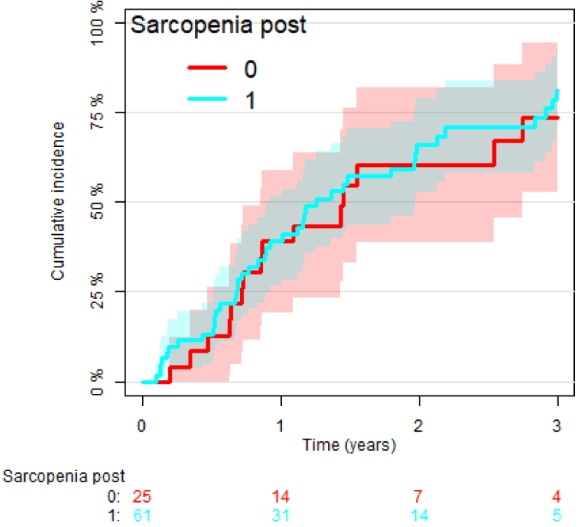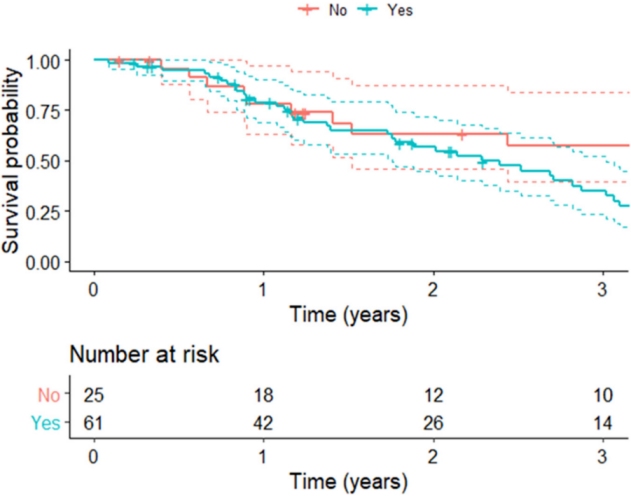Surgical Outcomes in Mesothelioma Patients Predicted by Muscle Loss
By Warren Miller. 12th October 2022
Predicting negative outcomes of mesothelioma surgery was the focus of a new study that was recently published in the Cancers journal. The study was by researchers at the University Hospital of Padova in Italy who looked to find a link between sarcopenia and poor short-and long-term outcomes after surgery for mesothelioma.
What is Sarcopenia
Sarcopenia has been defined as an age related, involuntary loss of skeletal muscle mass and strength.
Muscles grow larger and stronger until the age of 30. At some point after this, there is a loss of muscle mass and function. Skeletal muscle mass and skeletal muscle strength decline in a linear fashion. Sarcopenia usually accelerates around the age of 75, with up to 50% of mass being lost by the 8th decade of life.
Physically inactive people can lose as much as 3% to 5% of their muscle mass each decade after age 30. Even if you are active, you’ll still have some muscle loss. There’s no test or specific level of muscle mass that will diagnose sarcopenia. Any loss of muscle matters because it lessens strength and mobility. It’s a factor in frailty and the likelihood of falls and fractures in older adults.
Sarcopenia can be evaluated by measuring muscle strength. Simple tests for this include a hand grip test and a chair stand test. Muscle quantity can also be measured by physical performance with a walking test and by CT and MRI scans.
Sarcopenia and Mesothelioma Outcomes
Significant muscle loss is one of the most common and serious cancer-related symptoms. It is strongly connected to a poor prognosis in patients with advanced disease. Sarcopenia is a well-established predictor of negative outcomes in some diagnoses. But is not well investigated in malignant pleural mesothelioma.
The Italian study initially included 305 patients who were treated surgically for pleural mesothelioma. Of these 219 where excluded as:
- They were operated on with palliative intent
- They did not have pre and post operative CT scans
- Macroscopic Complete Resection was not achievable (all visible cancer not removed)
Sarcopenia was assessed by measuring the muscular density of muscles that closely surround the spine on pre-and post-operative CT scans. A threshold value of 30 Hounsfield Units (HU) was identified.
Overall survival rates of patients with post-operative sarcopenia (turquoise), compared with those without sarcopenia (red)

Sarcopenia was found pre-operatively in 57 (66%) patients and post-operatively in 61 (74%).
The Post-operative sarcopenic patients had a lower 3-year overall mesothelioma survival rate than those who were non-sarcopenic - Sarcopenic patients: 34.9%. Non-sarcopenic: 57.6%.
There was a higher frequency of post-operative complications in Pre-operative sarcopenia patients than non-sarcopenia patients. (65% vs. 41%).
Cumulative incidence of relapse of patients with post-operative sarcopenia (turquoise), compared with those without sarcopenia (red)

The evaluation of sarcopenia through a non-invasive method, may help doctors to select the best candidates for mesothelioma surgery in a multimodality setting. They also suggest starting dedicated physical therapy programs before surgery.
Age-related muscle loss may be a predictor of negative mesothelioma outcomes after surgery. The news might help patients and doctors make better treatment decisions.
The main conclusion: muscle loss means more negative outcomes after mesothelioma surgery.
If you would like to ask any mesothelioma or asbestos related questions, please contact us on the freephone number below and ask for Warren or Kathy

Source:
Sarcopenia as a Predictor of Short-and Long-Term Outcomes in Patients Surgically Treated for Malignant Pleural Mesothelioma. Cancers 14, no. 15 (2022): 3699.
https://www.mdpi.com/2072-6694/14/15/3699
Author
Warren Miller MSc. BSc
Claims manager and website author
Warren has been assisting victims of Mesothelioma and asbestos cancer for more than 18 years. He is also the senior technical author of this website, responsible for sourcing legal and medical material beneficial to those who may been recently diagnosed with an asbestos disease.. Read more >













